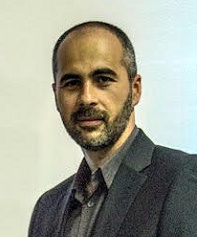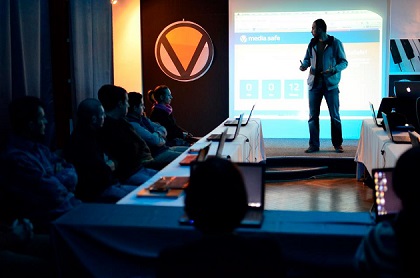“Parents need to step into their children’s world and start knowing and using technology… being nostalgic about the good old times simply doesn’t help”, believes expert Cosmin Cret.
 Parents should understand the technologicall environment in which their children live. / Media Safe
Parents should understand the technologicall environment in which their children live. / Media Safe
New media, mobile devices and high-speed internet have become a central part of our daily life. Do they affect the way we experience reality? How should parents face the constant advances?
“As Christians we need to understand the times we’re living in”, believes Cosmin Cret, a creative designer and associate professor at the Media Department of the Babes-Bolyai University in Cluj (Romania).
He has been training both parents and teenagers in how to use the new technologies and social networks in a wise way.
Cret believe “the progress of technology is inevitable.” Of course, Christians should avoid “the dark side”, but “being nostalgic about the good old times when technology was not an issue, simply doesn’t help.”
What about the developments happening in virtual reality? The media expert admits it can become “an over-extension of the human body that will definitely amputate our perception of reality.”
Read the full interview Evangelical Focus did with Cosmin Cret.
 Cosmin Cret.
Cosmin Cret.Question. Many people say technologies of communication are advancing too fast. What is your opinion, should we join in and use them? Should we distance ourselves from some of the new developments?
Answer. The progress of technology is inevitable and yes, it is fast. So, we basically have three options: isolate from it, assimilate it as it comes or use it responsibly to serve your purpose.
I’m trying to benefit from it trying to get what is good and avoid the dark side. Actually, technology is neutral, it’s just metal, plastic… but the information, the content, is what gives us trouble. Being nostalgic about the good old times when technology was not an issue, simply doesn’t help.
Q. Do you think young people will be over-connected in the future and this could affect their personal relationships in the real world?
A. This is already happening. The mobile technologies are making this easier. It’s so true that words like intimacy, privacy and even friend, share, connect, follow… have new meanings.
Young people’s lives are a mixture of real and virtual and it seems that it’s getting harder to live in the real world. Psychological disorders caused by excessive social media for example, are already treated in clinics. I believe this will have more consequences that we are not aware of yet.
Q. What do you suggest to Christian parents when it comes to educating their children in the use of technologies?
A. As a parent, the worst-case scenario is to reject media and technology. This can be educated at a level where you are aware of it so you as a parent can take control of the digital life of your children. Parents need to step into their children’s world and start knowing and using technology. They cannot pretend media doesn’t have an influence and they have to control it.
Q. Do you think people in Eastern European countries are ahead and more interested in using technologies than those living in Western European countries?
A. Eastern Europe is definitely a growing market and at least for Romania, the Internet coverage and speed in the urban areas is in top 5.
That explains a lot. Cheap and fast Internet, several cell phone companies offering great deals, etc…
Q. Give us a real-life example of how parents some times are ‘old-fashioned’ compared to what their children know about social media, mobile phones…
A. I think the funniest part is that some parents simply don’t understand the lack of privacy in Social Media. For example, they are posting private messages on timelines or public comments.
Some of the situations are hilarious or embarrassing, especially when they message their kids. The use of smartphones is also an issue for many of them, especially the older generation. They still believe a phone is just a phone!
 A Media Safe session giving training to parents ana other gorwn-ups. / Media Safe
A Media Safe session giving training to parents ana other gorwn-ups. / Media Safe
Q. You have developed a program to teach in churches in Romania, helping parents to engage and use new technologies well. Tell us about this.
A. When we started our Media Safe program, we didn’t realise the huge need for getting informed. Later, traveling in the US, I’ve got the same feedback from the parents.
Since then, we are invited to different conferences, youth and parents meetings to share our experience. I gathered a small team of Christian media professionals in order to approach the subjects the best way we can. This topic is never expiring, so I believe there is still a lot to do in this field, and not only in the church.
Q. Where will we be in 10 years? Will advances like virtual reality be good, bad or just neutral?
A. Virtual reality is not new, but it’s getting better and better. If it will create a great experience for the users, I think many will adopt it.
It will make the line between real and virtual thinner, our brains will try to adapt… a lot of confusion and uncertainty down the road.
I think in this case, it is not neutral, it’s an over-extension of the human body that will definitely amputate our perception of reality.
Q. Is there anything else you would like to add?
A. As Christians we need to understand the times we’re living in. We are using the good side of media in our churches. We rely on technologies in our communication, public services, administration etc.
At a personal level, if we know where to draw the line, we will get stronger in our faith and we will be able to raise our children better.
ABOUT COSMIN CRET
Cosmin Cret lives in the region of Cluj-Napoca, in Romania. He works as a creative designer for RomaniaOne and PressOne national Media company.
He is the Media director of 4DMinistries International, and works as an assistant professor at the Theatre and Television Faculty, Media department of the Babes-Bolyai University in Cluj.
He has been working in youth and children ministry for 16 years and is involved in a new church plant.

Las opiniones vertidas por nuestros colaboradores se realizan a nivel personal, pudiendo coincidir o no con la postura de la dirección de Protestante Digital.
Si quieres comentar o